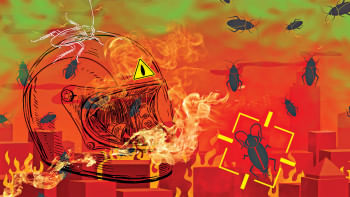City of bougainvillea

Reshma had finished her chores, just like every other day, almost 30 minutes ago. She looked around the white marbled kitchen counter as her ears fixated on the tick-tock sound of the clock. She has always felt very displaced in this house. She often felt that her raggedy, washed-out clothes looked even more worn out in this majestic house with regal doors. Her sickly hands and calloused fingertips cowered in front of the expensive bone china plates she washed every morning.
Her feelings of displacement are not stronger than her hunger. She was here to wipe the white floors, wash their clothes, and do the dishes. The lady of the house, who she calls Apa, told her that their washing machine does not wash the clothes properly. According to her, "It's always better when a person does it."
It was the third day of the month–payday. Reshma was ecstatic. She ran out of groceries almost two days ago.
She sat on the sparkling white floor of the kitchen, waiting for the lady of the house to come home. Reshma does not know what Apa does for a living, but she knows that Apa has a 'big' job. They rarely talk.
Reshma is aware of her set of duties so she does not speak unless it is needed. Though, she often stares at Apa while she gets ready to leave for the day. Her vivid dresses are hard to look away from; they remind Reshma of the beautiful pink and magenta bougainvillea scattered all around this neighborhood.
Raisa, the only child of the household, came to the kitchen for a glass of water a while ago. When she first started working in this house, she thought Raisa was older than her but as time passed, she realised Raisa was younger.
Every morning, Apa prepares a bowl of oats with freshly cut fruits for Raisa. Reshma was not allowed to touch her food. She stared in awe as Apa picked fresh yellow bananas and different exotic fruits for her daughter. Raisa hated bananas. Apa and she has a spat over bananas almost every day.
Reshma was starving. In an impulsive moment of hunger, she decided to eat the leftover banana with the little umber spots from the kitchen counter. She was supposed to throw it out anyway. Right at that moment, Raisa entered the kitchen. Reshma's eyes widened as her fingertips squeezed the ripened flesh harder. The deafening silence inside the room was shortly cut by the sound of the fruit being thrown in the trash.
Reshma's mind raced as she continued to stare at the white floors, thinking about the consequences of her lowly act. She has been working in this house for almost a year. She regretted it. She was getting ready to apologise to Apa and beg for her forgiveness.
Raisa's footsteps echoed loudly inside the house as Apa came home. Reshma continued to stare at her own feet, gripped by utter dread as they continued talking. When she entered the kitchen, Reshma started getting ready to be on her knees, but Apa did not say anything to her; she merely handed Reshma her salary.
"You have been a great help for the last year. From tomorrow, you do not need to come here anymore."
Reshma was on the verge of tearing up, but she didn't cry. Instead, she felt a cloud of uncertainty hovering over her head.
This was not the first time she lost her work out of nowhere. She used to work at another house before this one, where she was let go because she was "too pretty". The Apa of that household implied something might happen between her husband and Reshma. It was humiliating, but what could she do? She was just a maid.
"Please let me explain myself. I haven't eaten anything in the past 24 hours. It was just one banana. Please forgive me. I will never repeat this," she wanted to say.
Reshma wanted to beg Apa and explain to her how desperate she was. But no matter how hard she tried, the words seemed to get stuck at the tip of her tongue. So she stopped trying. Instead, almost like clockwork, she smiled and thanked the woman for the money and left.
It was always really sunny in this part of the town. It did not have that faint smell of sewage that you could find in Reshma's room. All the tall buildings, with their grandiose entrances adorned with bougainvilleas, seemed to mock Reshma every day. Today was not an exception either.
"The roads are too clean. The sun is too bright," she thought.
Reshma hated pink bougainvilleas.
Much like every other day, the sun refused to show her any mercy. Nevertheless, she looked up and stared at the vibrant bougainvilleas as a tinge of sourness settled at the back of her throat.
The afternoon sun burnt in its everlasting glory. Little drops of pearl-shaped sweat raced down her face as she continued to walk forward. The bright sun and the little pink petals were burning her eyes. It was still a long way home.
Jannatul Naeem Tasmiah is a student of English Literature at Jahangirnagar University.

 For all latest news, follow The Daily Star's Google News channel.
For all latest news, follow The Daily Star's Google News channel. 










Comments